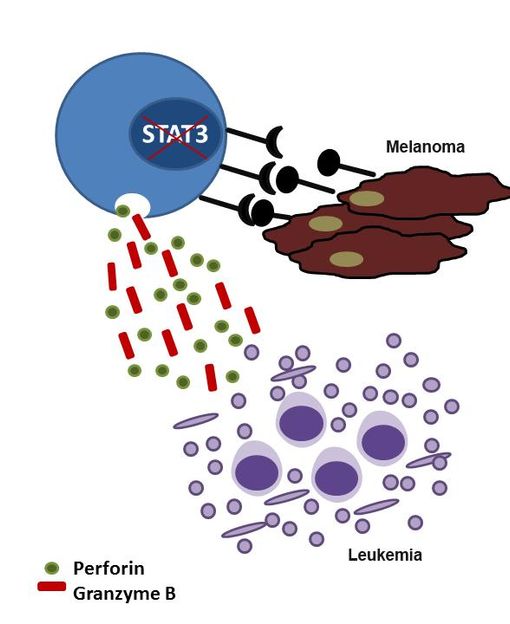An unexpected bonus – blocking STAT3 could help cancer patients in two ways
The STAT transcription factors are involved in the development of many forms of cancer. STAT3 is frequently activated in tumour cells, so drugs targeting STAT3 could be used in cancer therapy. However, STAT3 is also important in the development of the immune system. Dagmar Gotthardt and colleagues at the Vetmeduni Vienna now show that blocking STAT3 in cells of the immune system actually leads to increased anti-tumour immunity. Anti-STAT3 therapy may thus be highly promising.

Loss of STAT3 makes NK cells more efficient in recognizing and destroying melanoma cells. Additionally, the excretion of enzymes that fight leukemia cells is increased.
Dagmar Gotthardt/Vetmeduni Vienna
The so-called Signal Transducers and Activators of Transcription, or STATs, are key components of many different signalling pathways. Not surprisingly, then, when something goes wrong with their regulation the consequences can be severe and many types of cancer are known to be associated with increased activities of one or more STAT protein. STAT3 is a frequent culprit and is often found to be activated in tumour cells. Considerable efforts are going into developing inhibitors of STAT3 for use in cancer therapy but it is unclear whether these will turn out to be suitable for use in patients.
The problem is that STAT3 is not all bad but has a number of crucial functions in the healthy body. In particular it is important for the development of several kinds of cells of the immune system. The intriguingly named Natural Killer (NK) cells represent the first line of defence against viruses and cancer, to which they react by producing a range of proteins that attack the infected cells. It is important to investigate how this key component of the body’s own anti-cancer defence mechanisms might respond to the inactivation of STAT3.
The issue has been tackled by Dagmar Gotthardt and colleagues in the Institute of Pharmacology and Toxicology of the University of Veterinary Medicine, Vienna (Vetmeduni Vienna). Surprisingly, the loss of STAT3 in NK cells of the mouse led not to a decrease but to an increase in killing activity against melanoma cells and leukaemia cells. The decrease in metastasis caused by melanoma cells was especially dramatic and confirmed that NK cells lacking STAT3 are extremely efficient killers of tumour cells.
Gotthardt is naturally excited by the finding. As she says, “we were expecting the loss of STAT3 to make the NK cells less efficient. Instead it makes them even more potent killers. Inhibiting STAT3 could thus help cancer patients in two ways, both stopping the cancer cells from dividing and helping the patients’ NK cells to fight them more efficiently.”
Original publication
Other news from the department science

Get the life science industry in your inbox
By submitting this form you agree that LUMITOS AG will send you the newsletter(s) selected above by email. Your data will not be passed on to third parties. Your data will be stored and processed in accordance with our data protection regulations. LUMITOS may contact you by email for the purpose of advertising or market and opinion surveys. You can revoke your consent at any time without giving reasons to LUMITOS AG, Ernst-Augustin-Str. 2, 12489 Berlin, Germany or by e-mail at revoke@lumitos.com with effect for the future. In addition, each email contains a link to unsubscribe from the corresponding newsletter.


















































